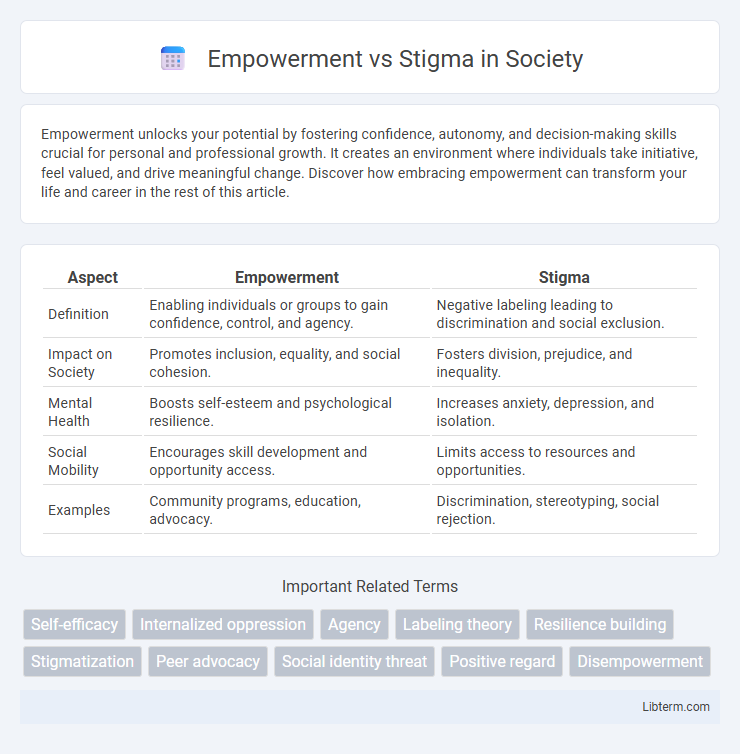Empowerment unlocks your potential by fostering confidence, autonomy, and decision-making skills crucial for personal and professional growth. It creates an environment where individuals take initiative, feel valued, and drive meaningful change. Discover how embracing empowerment can transform your life and career in the rest of this article.
Table of Comparison
| Aspect | Empowerment | Stigma |
|---|---|---|
| Definition | Enabling individuals or groups to gain confidence, control, and agency. | Negative labeling leading to discrimination and social exclusion. |
| Impact on Society | Promotes inclusion, equality, and social cohesion. | Fosters division, prejudice, and inequality. |
| Mental Health | Boosts self-esteem and psychological resilience. | Increases anxiety, depression, and isolation. |
| Social Mobility | Encourages skill development and opportunity access. | Limits access to resources and opportunities. |
| Examples | Community programs, education, advocacy. | Discrimination, stereotyping, social rejection. |
Understanding Empowerment and Stigma
Empowerment involves fostering self-confidence, autonomy, and access to resources that enable individuals to take control of their lives, promoting positive identity and well-being. Stigma refers to the social disapproval and negative stereotypes that marginalize individuals, leading to discrimination and diminished self-worth. Understanding empowerment requires recognizing the detrimental impact of stigma and implementing strategies that challenge prejudices while bolstering individual and community strengths.
The Psychological Impact of Stigma
Stigma inflicts profound psychological harm by fostering feelings of shame, isolation, and diminished self-worth among affected individuals. Empowerment combats these effects by promoting self-acceptance, resilience, and a positive identity, thereby restoring mental health and social inclusion. Research indicates that empowerment-based interventions significantly reduce anxiety and depression linked to stigma, enhancing overall psychological well-being.
Empowerment: Definition and Core Principles
Empowerment refers to the process of enabling individuals or groups to gain control over their own lives by fostering self-confidence, autonomy, and access to resources. Core principles include participation, where individuals actively engage in decision-making; access to information, ensuring informed choices; and support networks, which provide encouragement and assistance. Empowerment contrasts with stigma by promoting dignity and self-worth rather than labeling or marginalizing people based on social biases.
Societal Roots of Stigma
Stigma towards marginalized groups often stems from deep-rooted societal norms, cultural beliefs, and systemic inequalities that perpetuate fear and misunderstanding. Empowerment challenges these negative perceptions by promoting education, inclusive policies, and community support, which help dismantle prejudices embedded in social structures. Addressing the societal roots of stigma requires a transformative approach that targets institutional biases and fosters empathy to create lasting social change.
The Role of Language in Empowerment and Stigma
Language shapes perceptions of individuals and groups, playing a critical role in either empowerment or stigma. Positive, person-centered language fosters self-worth and inclusion, while derogatory or outdated terms reinforce negative stereotypes and discrimination. Choosing words thoughtfully promotes dignity and can transform societal attitudes toward marginalized communities.
Strategies to Combat Stigma
Implementing education campaigns that increase awareness and understanding about mental health conditions plays a critical role in combating stigma. Encouraging personal storytelling and peer support groups fosters empowerment by normalizing experiences and reducing feelings of isolation. Promoting inclusive policies and training programs within workplaces and communities ensures respectful treatment and equal opportunities for individuals facing stigma.
Benefits of Fostering Empowerment
Fostering empowerment enhances individual autonomy, promotes mental health resilience, and supports social inclusion, effectively counteracting the negative effects of stigma. Empowered individuals demonstrate improved self-esteem, greater participation in community activities, and increased access to resources, leading to better overall well-being. Organizations that prioritize empowerment create inclusive environments that reduce discrimination and encourage positive identity development.
Case Studies: Empowerment Transforming Lives
Case studies highlight how empowerment initiatives significantly reduce stigma by fostering self-confidence and community support among marginalized groups. Programs in mental health and disability sectors demonstrate improved quality of life and social inclusion through skill-building and peer mentorship. Evidence from these cases confirms that empowerment transforms lives by shifting public attitudes and enabling individuals to overcome discrimination.
Overcoming Barriers to Empowerment
Overcoming barriers to empowerment involves dismantling stigma that limits self-efficacy and social inclusion. Access to education, supportive networks, and mental health resources are critical factors enabling individuals to reclaim autonomy and build resilience. Addressing systemic discrimination and promoting awareness campaigns foster environments where empowerment can thrive without the constraints of stigma.
Building a Stigma-Free Future
Building a stigma-free future requires empowering individuals through education, open dialogue, and community support to dismantle harmful stereotypes. Emphasizing empowerment fosters self-worth and resilience, enabling marginalized groups to challenge societal biases. Creating inclusive environments promotes mental health and social equity, driving sustainable change against stigma.
Empowerment Infographic

 libterm.com
libterm.com